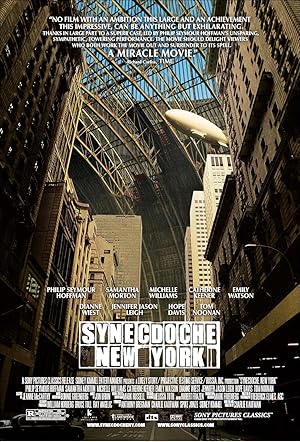Synecdoche, New York
| 2008Directed by: Charlie Kaufman
Main Plot
Synecdoche, New York follows the life of Caden Cotard, a theater director who grapples with existential questions as he navigates his personal and professional life. After receiving a prestigious grant, he embarks on an ambitious project to create a detailed replica of New York City inside a warehouse, aiming to capture the essence of life itself. As he immerses himself in this sprawling artistic endeavor, Caden's relationships with those around him, including his wife and daughter, become increasingly complex and strained. The lines between reality and art blur as Caden struggles with his own identity, mortality, and the passage of time. The film explores themes of creativity, the human condition, and the search for meaning in an often chaotic world, ultimately reflecting on the nature of existence and the inevitability of change.
Characters
- Philip Seymour Hoffman plays Caden Cotard, a theater director who creates an increasingly elaborate and life-consuming stage production reflecting his own existential struggles.
- Samantha Morton plays Hazel, a box office worker who becomes romantically involved with the protagonist, Caden, and represents themes of unfulfilled desires and existential struggle.
- Michelle Williams plays Claire Keen, an actress who becomes romantically involved with the protagonist, Caden Cotard, and is part of his ambitious theater project.
Ending Explained
In the ending of Synecdoche, New York, the protagonist, Caden Cotard, faces the culmination of his existential struggles and the complexities of his life. As he continues to create an elaborate play that mirrors his own existence, time becomes increasingly distorted. The boundaries between reality and art blur, reflecting his deep-seated fears of mortality and the search for meaning. In the final scenes, Caden realizes that his life is slipping away as he becomes consumed by his creation. He encounters various characters who represent different aspects of his psyche, and he grapples with the inevitability of death. The play he has constructed, which is a reflection of his life, becomes a metaphor for his inability to connect with others and his fear of being forgotten. Ultimately, Caden's journey leads him to a moment of acceptance. He acknowledges the futility of his pursuits and the transient nature of life. The film concludes with a poignant sense of resignation, as Caden understands that he must let go of his obsessive need for control and recognition. This resolution ties back to the overarching themes of identity, art, and the human condition, leaving viewers with a profound contemplation of existence.
